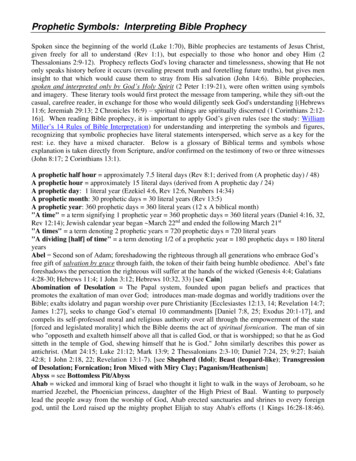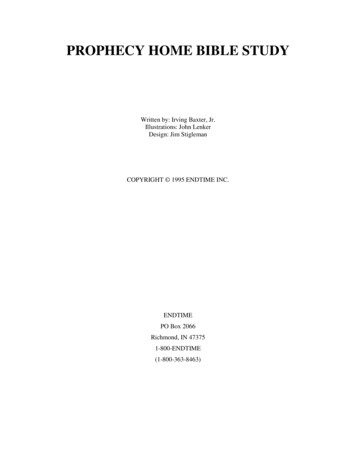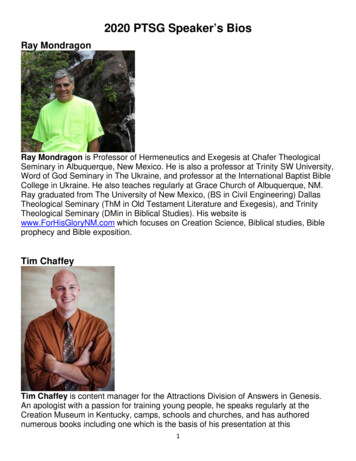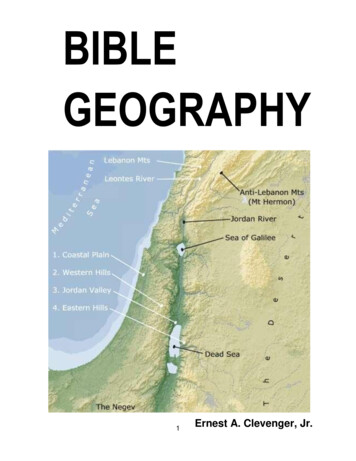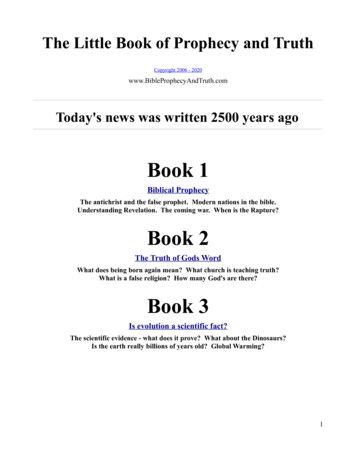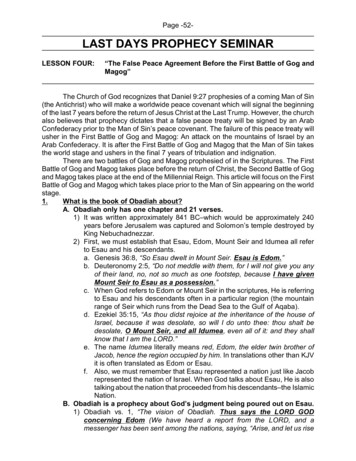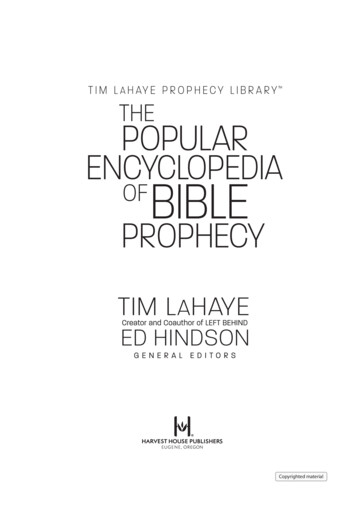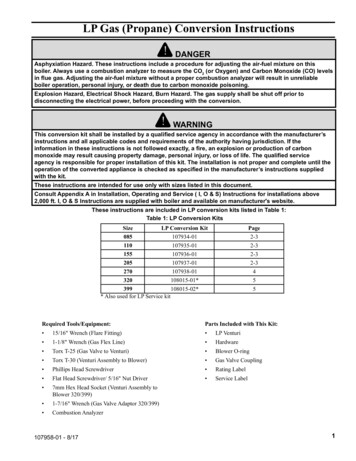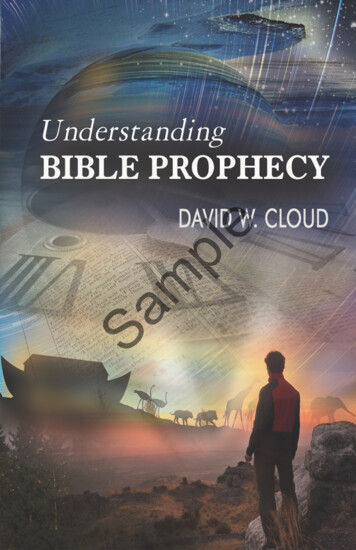
Transcription
eplSam
Understanding Bible ProphecyCopyright 2002 by David W. CloudISBN 1-58318-078-8SampleSecond edition August 2004Third edition August 2009Fourth edition February 2012Fifth edition November 2012Sixth edition 2017Seventh edition February 2018Seventh edition format change July 2021Published by Way of Life LiteraturePO Box 610368, Port Huron, MI 48061866-295-4143 (toll free) - fbns@wayoflife.orgwww.wayoflife.orgCanada:Bethel Baptist Church4212 Campbell St. N., London Ont. N6P 1A6519-652-2619 (voice) - 519-652-0056 (fax)info@bethelbaptist.caPrinted in Canada byBethel Baptist Print Ministry
ContentsSampleIntroduction .6The Interpretation of Prophecy.36The Covenants.115Daniel 2 The Times of the Gentiles .144Daniel 9 The Seventy Weeks .158Messianic Prophecy .167Great Prophetic Events of the Future .215Beware of Prophetic Speculation .365Bibliography .375
4Understanding Bible Prophecy2018 Edition of Understanding Bible ProphecyThe 2017 and 2018 editions of Understanding Bible Prophecyrepresent a major reconstruction of the course based onextensive new study and research over the past few years,including research in Israel itself.We have added memory verses for most of the sections.The section on “Interpretation of Prophecy” has beenextensively reworked and enlarged.pleThe section on the Covenants has been entirely reworked andgreatly enlarged.SamThe section on “Messianic Prophecies” has been greatlyenlarged.The old sections on “The Kingdom of God” and “A PropheticOverview of the Future” have been reworked and greatlyexpanded under the title of “Great Prophetic Events of theFuture.” In this section we cover the Valley of Dry Bones, theRapture, the Tribulation, the Antichrist, the Conversion ofIsrael, the Battle of Armageddon, the Resurrections andJudgments, Christ’s Kingdom, and the New Jerusalem.For 2018, there are the following new sections: The ministryof the prophets, the prophets from Adam to Malachi, thedivision of the writing prophets, the divine inspiration of theprophets, how God spoke to the prophets, the repetition ofthe prophets, the school of the prophets, the chronologicalorder of the prophets, and the prophetic writings as legaldocuments.
5PreliminaryReview QuestionsA lot of time and effort has gone into the creation of thereview questions which are designed to draw the student’sattention to the most important points of the lessons and tohelp him remember these points after the course is finished.Each question deals with things that the Bible student needsto keep in mind beyond the life of the course. The reviewquestions go over all of the important points in the lessons,thus pointing the student’s attention to the most significantmaterial.SampleThe questions help to focus the student’s attention on thethings that he should take away from the course and helpshim remember these things by providing a means by whichhe can easily go back to test himself.If you take the courses by yourself, don’t skip over the veryimportant review questions. Find someone who will test youand let them present the review questions to you. It is a veryimportant part of the learning process.For the classroom setting, the teacher can use our reviewquestions (plus his own, of course) to create appropriatesectional and final tests at the learning level desired.
IntroductionThis course is an introduction and overview of Bibleprophecy. In the Way of Life Bible Commentary Series westudy the prophets themselves (e.g., Isaiah to Malachi).Some Introductory Facts about Bible ProphecySample1. The main theme of Bible prophecy is Jesus Christ (Re.19:10; Lu. 24:44-46). If we study prophecy and fail to seeJesus, we have missed the main message. The main purpose ofthe Bible is to reveal God, and the fullest revelation of God isChrist, God manifest in the flesh. The reason God has givenHis revelation to mankind is that fallen men might bebrought back into right relationship with Him throughChrist, that we might know Him personally and grow in ourknowledge of Him forever. John 17:3 says that eternal life is toknow God in Christ, and this knowledge is revealed in theBible. Ephesians 1:8-17 says the mystery of God’s will, whichis contained in Scripture, is to redeem sinners and ultimatelyto bring all things together in Christ. This is God’s great planthat is revealed in the Bible and it will culminate in the newheaven and new earth.2. Prophecy in the Bible refers not merely to the foretelling offuture events, but to divine revelation in general. The “moresure word of prophecy” refers to the entire New Testament,not merely to future events (2 Pe. 1:19-21).3. There are two types of prophesying: forthtelling andforetelling, or preaching and prediction. The prophets of oldpracticed both aspects. Bible prophecies are composed of amixture of preaching and prediction, forthtelling andforetelling. You can see this in any of the prophets. Isaiahchapter one, for example, is mostly forthtelling (verses 2-24).
7IntroductionOnly verses 25-30 are foretelling of future events. NewTestament prophecy is also composed both of preaching(forthtelling) and foretelling (1 Co. 14:3). With thecompletion of the Canon of Scripture, the gift of propheticforetelling ceased, but there remains the gift of preaching orforthtelling (2 Timothy 4:2).How Bible Prophecies Are Different fromExtra-biblical Propheciese1. Bible prophecies are clear and detailed rather thanambiguous and vague.SamplNames are given in Bible prophecy. In Isaiah 44:28 - 45:4, KingCyrus is mentioned by name 150 years before he ascended tothe throne.Locations are given in Bible prophecy. For example, Micah 5:2gives the name of Jesus’ birthplace 700 years before He wasborn.Minute details are given in Bible prophecy. Psalm 22, forexample, describes Jesus’ crucifixion in amazing detail 1,000years before He was born.Dates are given in Bible prophecy. Daniel 9:24-27 tells exactlywhen Christ would come.But when it comes to prophecies outside of the Bible, youtypically find vagueness and generality.Consider Nostradamus (1503-1566), one of the most famousnon-Bible prophets. His messages are described as “obscure”even by those who believe in him. Consider one of his mostfamous prophecies:
8Understanding Bible Prophecy“Beasts ferocious from hunger will swim across rivers:The greater part of the region will be against the Hister,The great one will cause it to be dragged in an iron cage,When the German child will observe nothing” (centuries#2, quatrain #24).Some have said that this is a prophecy about Hitler andWorld War II, yet it is so vague and obscure that it could referto practically anything.SampleAstrological prophecies, too, are usually so vague that theyare meaningless. For example, a prophecy for those bornunder the sign of Aquarius might be as follows: “Severalfriends may have the feeling that you’ve been ignoring them,”or, “You are going to meet a person soon who will beimportant in your life.” That is so vague that it would be truefor most people at any time.2. Bible prophecies have never failed.The surety of Bible prophecy stands in great contrast to theuncertain predictions of astrologers and soothsayers.Consider the Oracle of Delphi. This was the high priestess atthe Apollo temple in Delphi, Greece. Croesus, king of thegreat Lydian Empire, consulted the oracle about whether hewould be victorious over the Persians. The oracle replied, “IfCroesus sends a great army against Persia, a mighty empirewill fall.” This vague statement is a “win-win” prophecy forthe soothsayer, since regardless of which empire fell, theprophecy would hold true! Croesus took the prophecy tomean that he would be successful, but he was defeated, and itwas his empire that fell. When Philip of Macedonia consultedthe Delphi oracle in 336 BC about his planned expeditionagainst Persia, she replied, “The bull is ready for slaughter, theend is near, the sacrificer is present.” This obscure nonsense is
9Introductiontypical of pagan “prophecies.” If the prophetess had said, “Youwill soon die and your son will conquer Persia,” then it wouldhave been a true prophecy of real significance.SampleConsider Jeane Dixon (1918-1997), a famed Roman Catholicpsychic and astrologer. When she was a child, Dixon’s mothertook her to a gypsy fortuneteller, who predicted that shewould be a famous seer. She supposedly foretold theassassination of President Kennedy, but we have never seenevidence of that. Mostly, she made false predictions. Sheerroneously predicted, for example, that the Soviets wouldbeat the U.S. to the moon, that World War III would begin in1958, that there would be a cure for cancer in 1967, that laborleader Walter Reuther would run for president in 1964, andthat President Bush would win the presidential election in1992 (actually Bill Clinton did).Consider Edgar Cayce (1877-1945). He a famous psychicwho gave prophecies while in a trance state, but hisprophecies were more typically false than true. He said, forexample, that China would be converted to Christianity by1968, and he predicted the arrival of Armageddon in 1999.Consider astrology. Those who have depended uponastrological forecasts have usually been disappointed. Twofamous astrologers in Britain said that World War II wouldnot happen. An astrologer named Naylor, whose predictionsappeared in the London Sunday Times, said, “In this column,for years, I have constantly laboured these points: Hitler’shoroscope is not a war-horoscope . there will be nowar” (August 27, 1939). Another British astrologer, EdwardLyndoe, said: “I see absolutely no signs of a Great War during1939” (The People, January 1, 1939, p. 11). Hitler startedWorld War II later that year.
30Understanding Bible ProphecyThe School of the ProphetsSamuel was the first prophet in Israel (Ac. 3:24; Heb. 11:32).In his day the first school of the prophets was set up (1 Sa.19:20). By Elisha’s day there were schools of the prophets atBethel and Jericho (2 Ki. 2:3, 5). Anathoth (“echoes”) was acity of prophets three miles north of Jerusalem. Jeremiahlived there (Jer. 1:1). It was the birthplace of two of David’stop soldiers, Abiezer (2 Sa. 23:27) and Jehu (1 Ch. 12:3).SampleToday Anathoth is a barren rocky hill that is used by Arabsfor grazing sheep and. It still lies in desolation today from thedestruction at the hands of the Babylonians 2,600 years ago.There are remnants of ancient walls, foundations, and wells.God had pledged that Anathoth would be judged because ofthe plot to kill Jeremiah (Jer. 11:21-23).“. bands of youths seem to have gathered aroundexperienced and accredited prophets, forming small coloniesaround them, learning from them, and seeking to imbibetheir spirit. . These schools, moreover, were centres oftheocratic ideas and ideals from which consecrated youngmen went out to exert considerable influence in the nation,and to hold up the torch of Divine truth amid the dark daysof apostasy. It seems likely, too, that sacred music and poetrywere cultivated at these schools, and that sacred traditionswere here treasured and transmitted both orally and inwriting” (J. Sidlow Baxter).The Chronological Order of the ProphetsThe Prophets wrote from the time during the division ofIsrael’s kingdom to the restoration of Israel after theBabylonian Captivity.
31IntroductionThe exact date of the prophets cannot be known withcertainty in every case, but the following is according toJames Ussher’s chronology:1. Prophets that ministered before the exile to BabylonSampleObadiah (887 BC) (to the northern tribes)Jonah (862 BC) (to Nineveh)Joel (800 BC) (to the northern tribes)Amos (787 BC) (to the northern tribes)Hosea (785-725 BC) (to the northern tribes)Isaiah (760-698 BC)Micah (750-710 BC)Nahum (713 BC)Zephaniah (630 BC)Jeremiah (629-588 BC)Habakkuk (626 BC)2. Prophets that ministered during the exile to BabylonEzekiel (595-574 BC)Daniel (607-534 BC)3. Prophets that ministered after the exile to BabylonHaggai (520 BC)Zechariah (520-518 BC)Malachi (397 BC)The Prophetic Writings as Legal DocumentsThere are many purposes for the major and minor prophets.God used the prophets to reveal His character. God used theprophets to warn Israel and call her to repentance. God used
32Understanding Bible Prophecythe prophecies as evidence of His existence and power. Heused the prophets to prepare for the coming of the Messiah.SampleAnother purpose of the prophets is to create eternal legaldocuments as testimonies of God’s dealings. Thesedocuments will stand forever as a record of and a justificationfor God’s dealings with Israel and the nations. There weremany other prophets who spoke in God’s name, but the 16(Isaiah through Malachi) were chosen by God as arepresentation of the whole. From these historical documentsit is clear that God was perfectly just in His dealings. In aneffort to bring Israel to repentance, God called and called andcalled and called. He beseeched and pleaded and warned andused every type of argument. In God’s name, the prophetspleaded as a mother and roared as a lion. Israel had zeroexcuse.At times, the repetition found in the prophets can seemalmost tedious and unnecessary, but every word is essential toestablish God’s eternal business.In the church, a word is established in the mouth of two orthree witnesses (Mt. 16:16). How much more is God’s Wordestablished by the mouth of these 16 imminent witnesses!Unfulfilled Bible PropheciesIn my personal study Bible I have marked the unfulfilledprophecies by bracketing them with a red pencil. I have alsomarked various major events with colored pencils. I usebrown for verses pertaining to the day of the Lord, light bluefor the Messianic passages, green for passages referring to theremnant, orange for the New Covenant, dark blue for theregathering of Israel, yellow for passages describing themillennial kingdom, and red for the second coming.
33IntroductionAs a study project, the student can go through the book ofZechariah and mark the unfulfilled prophecies withoutlooking at the following list.SampleGenesis 12:7; 13:14-17; 15:17-21; 17:1-21; 22:15-18; 26:2-5;28:12-15; 35:9-13Deuteronomy 30:1-102 Samuel 7:13-16Psalm 1:5-6; 2:1-12; 9:1-20; 10:12-18; 14:7; 18:4-19, 43-50;21:4-13; 22:22-31; 23:6; 24:7-10; 25:13; 37:17-18, 20, 22,28-29, 34, 38; 45:3-17; 46:2-11; 47:1-9; 48:1-14; 50:1-6; 51:19;53:6; 58:9-11; 60:2-3, 6-12; 65:1-5; 66:1-4; 67:1-7; 68:20-35;69:32-36; 71:20-24; 72:1-19; 73:27; 75:8-10; 76:1-12; 79:13;86:9; 94:23; 96:11-13; 97:1-12; 98:1-9; 99:1-5; 100:1-5; 101:1-8;102:12-22, 26-28; 107:40-43; 108:1-13; 110:1-7; 112:10;121:1-7; 125:1-5; 126:1-6; 128:1-6; 129:4; 130:8; 132:13-18;138:4-5; 145:1-13, 19-21; 146:7-10; 147:2-3, 12-15; 148:14;149:1-9Isaiah 1:25-31; 2:1-5, 10-22; 4:1-6; 5:26-30; 6:11-13; 8:14-22;9:7; 10:20-27; 11:4-16; 12:1-6; 13:1-16; 14:1-27; 16:1-5; 17:6-8,12-14; 18:7; 19:1-25; 22:20-25; 23:18; 24:1-23; 25:1-12;26:1-21; 27:1-13; 28:1-6, 14-22; 29:5-8, 17-24; 30:18-33;31:2-9; 32:1-8, 15-19; 33:2-24; 34:1-17; 35:1-10; 40:1-11;41:10-20; 42:1-17; 43:1-21, 25-26; 44:1-8, 21-27; 45:14-25;46:12-13; 48:20; 49:5-26; 51:3-11, 22-23; 52:1-15; 53:12;54:1-17; 55:5, 12-13; 56:1-8; 57:13-19; 59:16-21; 60:1-22;61:1-11; 62:1-12; 63:1-6; 65:8-25; 66:5-24Jeremiah 3:14-19; 4:19-31; 10:10-11; 16:14-21; 23:3-8; 24:4-7;25:26-38; 30:3-11, 16-24; 31:1-14, 16-40; 32:37-44; 33:6-26;46:27-28; 50:1-5, 17-20; 51:19-24Ezekiel 11:17-21; 14:22-23; 16:53-55, 59-63; 20:33-38, 40-44;28:25-26; 30:1-5; 34:11-16, 22-31; 35:14-15; 36:8-15, 23-38;Eze. 38-48Daniel 2:33-35, 43-45; 7:7-14, 20-27; 8:9-14, 23-25; 9:27;11:36-45; 12:1-4, 9-13
34Understanding Bible ProphecySampleHosea 1:10-11; 2:14-23; 3:5; 5:15; 6:1-3; 14:1-9Joel 1:14-20; 2:1-11, 15-32; 3:1-21Amos 5:18-20; 9:11-15Obadiah 1:15-21Micah 1:3-4; 4:1-13; 5:3-15; 7:1-20Nahum 1:13-15Habakkuk 2:14Zephaniah 1:2-18; 3:8-20Haggai 2:6-9, 21-23Zechariah 1:16-21; 2:1-12; 3:8-10; 6:12-13; 8:3-8, 11-15,18-23; 9:1-17; 10:1-12; 11:15-17; 12:1-13; 13:1-9; 14:1-21Malachi 1:5, 11; 3:1-5, 17-18; 4:1-6Matthew 19:28-30; 24:4-51; 25:1-46; 26:29, 64Mark 13:5-37Luke 1:32-33, 67-75; 3:17; 17:24-37; 19:11-27; 21:7-36; 22:69John 17:24Acts 3:19-21Romans 11:25-27; 14:10-121 Corinthians 1:7; 3:13-15; 4:5; 6:2-3; 15:20-582 Corinthians 5:1-10Ephesians 2:19-22Philippians 3:20-21Colossians 3:1-41 Thessalonians 1:10; 2:19; 3:13; 4:13-18; 5:1-32 Thessalonians 1:7-10; 2:7-121 Timothy 6:142 Timothy 3:1-13; 4:1, 3-4, 8Hebrews 1:11-12; 10:13; 11:161 Peter 1:3-5, 112 Peter 2:17; 3:3-131 John 2:18; 3:2Jude 13-15, 24-25Revelation 2:7, 11, 17, 26-28; 3:5, 10-11, 21; chapters 4-22
35IntroductionREVIEW QUESTIONS ON THE INTRODUCTION TOUNDERSTANDING BIBLE PROPHECYSample1. What is the main theme of Bible prophecy?2. In what passage did Jesus say that the law of Moses, and theprophets, and the psalms spoke of Him?3. What verse says “the testimony of Jesus is the spirit ofprophecy”?4. What are the two types of prophecy in the Bible?5. What verse says that prophesying is speaking to men toedification, exhortation, and comfort?6. What are two ways that Bible prophecy is different fromprophecies in the world?7. Cyrus was named by what prophet before his birth?8. The prophecy of Cyrus was given in Scripture how manyyears before he was born?9. What prophecy gives the name of Jesus’ birthplace?10. What Psalm gives the details of Christ’s crucifixion,including the words He spoke on the cross?11. Nostradamus’ prophecies are described as .12. What are two reasons why there are difficulties in Bibleprophecy?13. What are three reasons why believers should studyprophecy?14. Approximately how much of the Bible is prophecy?15. What are three things that Bible prophecy can produce inthe Christian life?16. In what book and chapter did Jesus rebuke the disciplesfor not believing the prophecies?17. In what book does Jehovah God use prophecy as anevidence of the Bible’s divine inspiration?18. How is fulfilled prophecy an evidence that the Bible istrue?
The Interpretation of ProphecyMEMORY VERSES: Deuteronomy 29:29; Isaiah 45:21; Acts15:14-15; Romans 11:25-27; 1 Corinthians 10:32; Ephesians3:4-6In this section, we deal with the most important rules forinterpreting Bible prophecy.Sample1. Interpret Bible prophecy with a spiritual mind.2. Interpret Bible prophecy by understanding the words.3. Interpret Bible prophecy by the literal method.4. Interpret Bible prophecy by its context.5. Interpret Bible prophecy by comparing Scripture withScripture.6. Interpret Bible prophecy by knowing Old Testamenthistory.7. Interpret Bible prophecy by knowing the major propheticevents.8. Interpret Bible prophecy by understanding Old Testamentparallelism.9. Interpret Bible prophecy by understanding the perspectiveof prophecy.10. Interpret Bible prophecy by distinguishing Israel from thechurch.11. Interpret Bible prophecy by Dispensationalism.12. Interpret Bible prophecy by distinguishing interpretationfrom application.13. Interpret Bible prophecy by using the right tools.14. Interpret Bible prophecy by devoting time to it.15. Interpret Bible prophecy by patience and persistence.
37The Interpretation of ProphecyA Spiritual MindThe first and foremost requirement for effective Bible study isto be born again and to walk according to the leading of theHoly Spirit (1 Corinthians 2:14 - 3:3). There are three types ofpeople described in 1 Corinthians chapters two and three: thenatural man, the spiritual man, and the carnal man.SampleThe natural man (1 Co. 2:14) is the unsaved person who isspiritually dead and blind (Eph. 2:1-3; 2 Co. 4:4). He cannotunderstand the things of God. “The deepest biblical scholar, ifhe fails to find Christ, knows less of the real meaning of thegospel than the humblest Christian who is living in the faithof the Son of God” (Pulpit Commentary). When the heartturns to the Lord, though, and receives Jesus Christ as Lordand Savioiur, the blindness is lifted (2 Co. 3:14-17). When Iwas growing up in a Baptist church, I had a Bible and Istudied the Bible in Sunday School and knew it well enoughto win Sword Drills and memory verse contests, but the Bibledidn’t become a living Book for me until I was converted atage 23.The spiritual man (1 Co. 2:15-16) and the carnal man (1 Co.3:1-4) refer to believers.The believer is either spiritual or carnal depending on hiswalk with Christ, depending on whether he is walking in theflesh or the Spirit (Ga. 5:16-25). The carnal or worldlybeliever, because he is not walking in the Spirit, cannotunderstand the deeper things of Scripture. He can understandmilk but not meat. See Hebrews 5:12-14.In Bible study, spiritual life is more important than technicalskill, tough skill is important. R.A. Torrey said, “A personwho understands the language of the Holy Spirit, but who
38Understanding Bible Prophecydoes not understand a word of Greek or Hebrew or Aramaic,will get more out of the Bible than one who knows all aboutGreek and Hebrew but is not born again. It is a welldemonstrated fact that many plain men and women whopossess no knowledge of the original languages in which theBible was written have knowledge of the real contents of theBible. Their understanding of its actual teaching and itsdepth, fullness, and beauty far surpasses that of many learnedprofessors in theological faculties.”SampleChrist gave two promises about knowing the truth. The manwho led me to Christ taught me these verses, and I have lovedthem since the time I was saved. I held to these promiseswhen I was seeking to know what church to join as a newChristian. I have held to these verses as I have sought to knowthe right doctrine through all the years. In John 8:31-32,Christ said that I must continue in His Word to know thetruth. To continue means to continue to read it and study itand hear it. And in John 7:17, Christ said that I must doGod’s will in order to know the truth, meaning that I mustobey God’s Word. It is not enough to read the Bible andmemorize the Bible. I must obey it. Many people read theBible, even memorize large parts of it, but they do not obey itand as a result they do not grow and they often go astray intosin and error.Understand the WordsThe most basic thing necessary for understanding the Bible isto know the definition of its individual words. This is not aprinciple of interpretation, but it is an essential part of Biblestudy.
39The Interpretation of ProphecySamplJudah (v. 1)Jerusalem (v. 1)LORD (v. 2)heavens (v. 2)crib (v. 3)holy (v. 4)Zion (v. 8)Sodom and Gomorrah (v. 9)sacrifices (v. 11)courts (v. 12)sabbaths (v. 13)land (v. 19)faithful city (v. 21)oaks (v. 29)gardens (v. 29)eFor example, if we look at the first chapter of Isaiah, it isimpossible to understand this passage unless we understandthe following words:The effectual Bible student will have a good Bible dictionaryat hand (either in print or as part of a computer Biblesoftware package) so that he can look up every word that hedoesn’t understand. This is one of the ways that I gained agood foundation in Bible knowledge as a young Christian. Iwore out a Strong’s Concordance in the first year I was saved.We also recommend the Way of Life Encyclopedia of the Bible& Christianity. It is the only serious Bible dictionary that Iknow of that includes all of the Bible’s words and thatinterprets Bible prophecy from a literal perspective. Manypreachers have written to us through the years to say that thisis their most useful Bible study book. One preacher said thatif he was shipwrecked on an island and could only have threebooks, he would want the Bible, Strong’s Concordance, and theWay of Life Encyclopedia. A preacher in South Africa said thatif his house was burning and he could save two books other
40Understanding Bible Prophecythan the Bible, it would be Strong’s and the Way of LifeEncyclopedia.Following are some of the words that are repeated inprophecy that the student must understand:Branch. A name used by the O.T. prophets to refer to Christ(Isa. 11:1; Jer. 23:5; 33:15; Zec. 3:8; 6:12-13; Mt. 1:1; Isa.9:6-7; Re. 22:16). It identifies Christ as the seed of David andrefers to Him as the heir to David’s throne. This refers to theDavidic Covenant, which we will study in the next section.SampleBurden. In prophecy, a burden is a solemn pronouncementof judgment (Isa. 13:1). “A ‘burden,’ is the Hebrew wordmassa, referring to a heavy, weighty thing, a thing of greatsolemnity. It is used to describe a heavy load (Ex. 23:5; 2 Ki.5:17) and a heavy responsibility (Nu. 11:11). It is a messageof judgment. It is ‘heavy’ because the wrath of God is in it,and grievous for the prophet to declare” (Scofield).Consumption. This refers to destruction; judgment (Isa.10:22, 23; 28:22). The “consumption decreed” of Isaiahchapter 10 and 28 is the punishment God had promised torebellious Israel (Le. 26:16; De. 28:22). It points to the GreatTribulation. The Hebrew word translated “consumption” inIsa. 28:22 is translated “riddance” in Zep. 1:18 and“consume” in Eze. 13:13.Covenant. See the section on “The Covenants of God.”David. In prophecy, “David” usually refers to God’s covenantwith David and to Christ as the son of David (Isa. 9:6-7;55:3). See the section of this course on “The Covenants ofGod.”Day. The term “day” is used in many different ways in theBible, but one of the ways it is used is to refer to a period oftime during which God performs a certain work. Examples
41The Interpretation of Prophecyare “the day of the Lord” (Isa. 2:12), “the last day” (Isa. 2:2),and “the day of our Lord Jesus Christ” (1 Co. 1:8; Ph. 1:10;2:16; 2 Th. 2:2). We will look at “the last day” separately.SampleDay of the Lord. The period of time in which God willjudge the world and establish His kingdom on earth. It iscalled “the Lord’s day” in contrast to man’s day, which haslasted 6,000 years. In the day of the Lord, God will be exaltedand rebellious men will be humbled (Isa. 2:11-17) and thethrone of the world will belong to Christ. In the day of theLord, the present idolatrous world system will be judged andoverthrown (Isa. 2:18-21) in preparation for the coming ofChrist and the establishment of His kingdom. The day of theLord sometimes refers to one aspect of this work,particularly to the Great Tribulation (Isa. 2:10-21). In otherplaces, it refers to the entire period, including theTribulation, the Second Coming, the Millennial Reign, andthe Eternal state following the White Throne judgment. Insome passages, “the day of the Lord” refers to historicjudgments upon Israel that point to the final time ofjudgment. See Zephaniah 1:4-18.Ephraim. The younger of Joseph’s two sons (Ge. 41:50-52).Ephraim and Manasseh, Joseph’s sons, both became heirs toAbraham’s promises and blessings. Ephraim received thechief blessing when Jacob blessed the boys before his death(Ge. 48:1-22). Both sons are listed among the 12 tribes ofIsrael (Nu. 1:32-34; Jos. 17:14, 17; 1 Ch. 7:20). Thus, therewere actually 13 tribes, but Levi, the priestly tribe, was notcounted in with the 12 (Jos. 14:4). Ephraim occupied theland that later was called Samaria after the captivity byAssyria (1 Ki. 17:24). After the northern tribes broke withJudah, King Jeroboam, an Ephrathite (1 Ki. 11:26),established his capital in Shechem in Ephraim (1 Ki. 12:25).Bethel, where Jeroboam set up the idol and established thesystem of false religion, was also in Ephraim (1 Ki. 12:26-32;Jud. 4:5). Thus, Ephraim was at the heart of the idolatrousrebellion. That is why God often refers to the northern
Understanding Bible Prophecykingdom as Ephraim (Isa. 7:2, 5, 8, 9, 17; 11:13; Eze.37:16-19; Ho. 4:17; 5:3-15). In the list of the tribes that aresealed in Re. 7:5-8, Ephraim is replaced by Joseph. Dan isomitted entirely, and it has been speculated that this isbecause of Dan’s idolatry. In the Millennium, Ephraim isagain listed as one of the 12 tribes (Eze. 48:5). Some of themore important Bible verses dealing with the tribe ofEphraim are as follows: Nu. 1:10-33; 2:18-24; 26:28-37; De.33:17; Jos. 14:4; 16:4-9; 17:8-17; 21:5-21; Ju. 1:29; 7:24; 8:1-2;12:1-5; 17:1-8; 19:1-18; Eze. 48:5-6.pleHorn. The “horn” in prophecy is often a symbolic referenceto strength, power, and authority (1 Sa. 2:1; Job 16:15; Ps.75:4-5; Jer. 48:25; Zec. 1:21). It can refer to a king (Re.17:12). The “little horn” in Daniel refers to the Antichrist(Da. 7:8; 8:9-14).Indignation. Anger; contempt; disgust; abhorrence; theanger of a superior (Ne. 4:1; Es. 5:9; Da. 11:30; Mt. 20:24;26:8; Lu. 13:14; Ac. 5:17). The Hebrew word zaam, which istranslated “indignation”20 times, is also translated“anger” (Ps. 38:3), and “rage” (Ho. 7:16). “Indignation” mostfrequently refers to God’s wrath against sin (De. 29:28; Ps.69:24; 78:49; 102:10; Isa. 10:5, 25; 13:5; 26:20; 30:27, 30; 34:2;66:14; Je. 10:10; 50:25; Eze. 21:31; 22:24, 31; Na. 1:6; Hab.3:12; Mi. 7:9; Zep. 3:8; He. 10:27; Re. 14:10). In the O.T.prophets the word “indignation” especially refers to God’swrath which will be poured out during the GreatTribulation. “Indignation” also refers to the blasphemies ofthe Antichrist (Da. 8:19; 11:36).Sam42Isle. In the Old Testament, the word “island” has a widermeaning than the modern word. The root meaning ishabitable land, and it has the following meanings: (1) Dryland, as opposed to water (Is. 42:15). (2) An islandsurrounded by water (Is. 23:6; Je. 2:10; Ac. 27:16; 28:7; Re.1:9). (3) A coastland (Is. 20:6; Ge. 10:5). (4) The farthestregions of the earth (Is. 41:5; Zep. 2:11). Isle refers to nations
43The Interpretation of Prophecythat were established by the children of Noah (Ge. 10:5), thenations of the earth which shall worship Christ in Hisk
4 Understanding Bible Prophecy 2018 Edition of Understanding Bible Prophecy!e 2017 and 2018 editions of Understanding Bible Prophecy represent a major reconstruction of the co
